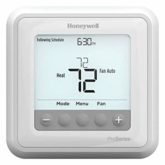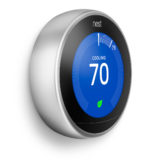There are several old wives’ tales and myths that are taken for fact when it comes to home comfort. But, is there any truth to them at all? Let’s take a look at some of the common things people believe when it comes to heating and cooling their homes and bust up some myths.
- I have a newer system, and therefore do not need to have maintenance done on it. This is 100% false. No matter if your HVAC unit is 6 months old, a year old, etc, unless you never turned the system on or kept it covered up, it has taken on a little wear and tear and has been exposed to the elements. Even if you have had no issues with it, that does not mean that problems (such as small refrigerant leaks) are not present or that they cannot occur in the future. It is always a good idea to have your system’s pressures, belt tensions, electrical connections, etc checked and the coils cleaned twice per year to ensure that it’s running safely and with peak efficiency.
- Turning the thermostat down as low as it will go or as high as it will go will heat or cool my home faster. This could not be any farther from true. Your heating and air system serves one purpose: to condition your home’s indoor air to a set temperature and then maintain that temp. The setting on your thermostat DOES NOT indicate the temperature of the air being blown out through your vents. Turning your thermostat down to 60 degrees doesn’t mean the system will blow out 60 degree air to cool your home down quicker. If you do turn the thermostat all the way down, what you are doing is causing your system to have to run constantly for a long time in order to reach that desired temp, which will drive up your power bill as well as put your system at risk of freezing up with the excess condensation this would create on your coils.
- Closing off unused/unoccupied rooms will help heat or cool more quickly. False. Heaters and AC systems do not continuously blow cool or warm air into a home. What they do is cycle and circulate the conditioned air already present. Your system has a component called the return register, which draws in the conditioned air and passes it through your air filter before going into the air handler to be re-chilled or heated as the blower pushes freshly cooled or heated air through the vents. The return must take in the same amount of air the vents are blowing out or otherwise, you get a buildup of air pressure, which leads to air leakage/seepage. Leakage occurs when excess air has to find a means of escape, and usually does via cracks in windows and doors. Air leakage can drive up your power bill as it will cause your air conditioning system to run longer, in turn also causing more unnecessary wear and tear. What does all that have to do with closing off vents and shutting doors? When you do that, you cut off the circulation of air and cause that return not to draw in the amount of air needed to balance output/intake, thus creating the buildup and leakage problem as well as airflow imbalance (not enough air being blown out of vents in some rooms, too much in others).
- Turning my system off while I am away will save me money on energy. There is a small degree of truth to this statement. Obviously, while a heating and air unit is off, it is not using any electricity and it is a good idea to turn it off while you are away. But only if you are going to be out for a brief time. Otherwise, using this method does very little to help out your wallet. The only way this will fully work is if you have a programmable or a smart thermostat. Programmable t-stats can have a schedule set so that it turns off at a specific time when you leave for work or school and comes right back on just in time for you to come back home to a comfortable home. Smart thermostats, such as the Nest Learning, make it even easier to set a schedule because they observe your daily routines and temp preferences and then generate their own schedule based off what they pick up on. They can also be controlled remotely via smartphone. (if you’re interested in programmables or a nest, we can help you! We are a certified nest professional and can install any programmable t-stat for you! )


Why will it not help to turn your system off when you go to work, school, or leave for vacation? It’s simple, really. Heat (or cold air if it is winter) builds up in your home if air isn’t getting cycled in order to maintain a set temperature. So, if air isn’t being pulled out to be re-cooled or heated and freshly cooled/warmed air isn’t being blown out, the temp rises or goes down quickly. So, when you get home and turn the system back on, it has to run for a while to get back to whatever you have the thermostat set on. This causes it to consume more energy by constantly running than if you had just left it on when you left. It also puts more unnecessary strain and wear on your equipment.
Hopefully, you have found all of this to be helpful, enlightening, and informative. Be sure to share it with anyone you know who may still be buying into these myths when it comes to keeping their home comfortable and as always, if you have any questions or HVAC needs, call on the experts at The Team You Can Trust!


